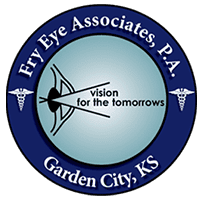Eye Infections
Infections of the eye and eyelids can range from mild viral conjunctivitis (a type of “pink eye”) to much more serious infections such as corneal ulcers, shingles infection of the eye, cellulitis and endophthalmitis, that can lead to vision loss or loss of the eye. Proper treatment for these conditions depends on proper diagnosis, and the physicians at Fry Eye Associates have the training and experience that’s needed to diagnose and treat these potentially devastating conditions.
Eye Infections FAQ
The most important thing you can do is be evaluated early. If you do have a serious infection, better outcomes are more likely if treatment is started as soon as possible. There are several different potential signs of infection to watch for, including eyelid swelling, pain, eye redness, blurry vision and discharge.
This refers to an infection of the cornea, which is the clear layer in front of your eye that you can think of like the eye’s windshield or the first of two lenses if you want to think of the eye like a camera. These are serious infections and are most commonly due to various types of bacteria (though many other organisms can cause this), and are more commonly seen in people wearing contact lenses or who have eye trauma. These infections can quickly cause serious damage to the eye resulting in loss of vision. Proper diagnosis and prompt treatment with appropriate antimicrobial medications is critical to treating the infection and improving outcomes. Treatment of corneal ulcers often requires several office visits with close monitoring and very frequent medication use. Learn more here.
Yes. The herpes zoster virus which causes chicken pox and shingles does affect the eye in some people. It likes to mimic a variety of other common infectious and inflammatory conditions and thus can be easily misdiagnosed as something else. Treatment depends on which part of the eye is involved, but often a combination of antiviral and steroid medication is used. Learn more here.
Schedule Your Visit
Our doctors are here to help address your concerns about your eyes and are experts in finding solutions that work best for you.


